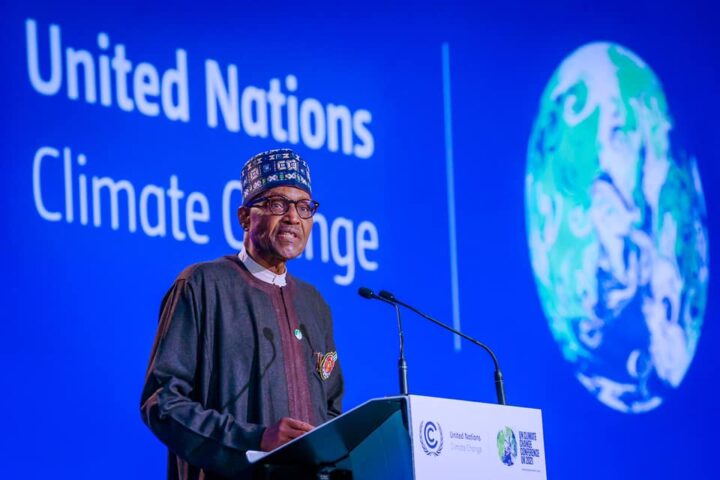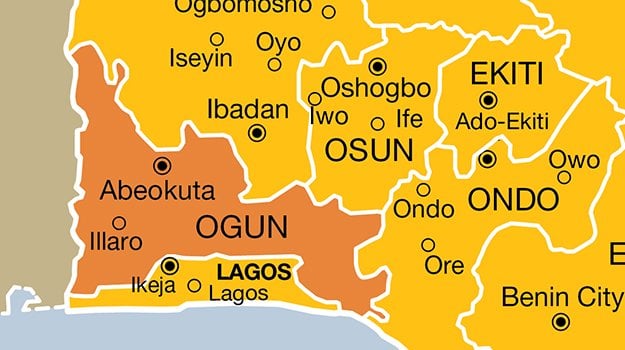BY JAIRUS AWO
In November 2021, at the United Nations climate change conference (COP26) held in Glasgow, President Muhammadu Buhari announced that Nigeria is committed to cutting down its carbon emissions to net-zero by 2060.
As a way of solidifying the country’s commitments at the COP26, Buhari subsequently signed into law the climate change bill to, among other things, provide for the mainstreaming of climate change actions.
However, several factors seem to suggest that Nigeria might have a tough time meeting its commitment to net-zero — the point which the amount of carbon emitted into the atmosphere equals the amount removed.
Advertisement
NIGERIA, A CLIMATE CHANGE HOTSPOT
In August 2021, the Intergovernmental Panel on Climate Change (IPCC) reported a “code red for humanity” which confirmed that failure to reduce carbon emissions in this decade will make the temperature rise above 1.5 degrees. This means that the global temperature, which currently stands at 1.1 degrees, might continue to increase at an irreversible rate.
Also, in its report published in 2022, the IPCC re-echoed findings of the previous year, which states that climate change is worsening extreme weather events like heat waves, droughts, wildfires, floods and hurricanes — these have exposed millions of people to acute food insecurity and reduced water security.
Advertisement
These concerns were reported as mostly affecting sub-Saharan Africa and other regions such as Central Africa, Asia and South America, which are some of the regions most vulnerable to climate change.
Being a part of sub-Saharan Africa, this also makes Nigeria a hotspot and puts the country at a disadvantaged position. This shows that Nigeria and other parts of the world need to engage accelerated efforts to curb global warming.
But how has Nigeria fared in this regard, in terms of keeping to some of its climate commitments?
NON-IMPLEMENTATION OF CLIMATE CHANGE ACT — SIX MONTHS AFTER BUHARI’S ASSENT
Advertisement
Despite plans to achieve its net-zero target by 2060, the Nigerian government seems to be relatively lax on doing what is needed to get on the path of emission reduction.
One such example is the non-implementation of the Climate Change Act. The Act, among other things, makes provisions for the federal ministry of environment to set a five-year carbon budget — the approved quantity of greenhouse gas emission that is acceptable over a specified time. However, this plan, among others, has suffered a setback because the climate change council has not been established.
The council is expected to be saddled with the responsibility of making policies and decisions on all matters concerning climate change in Nigeria, and helping to see that the country’s climate commitments come to fruition. But all these are still hampered by non-implementation.
Meanwhile, following the clamour by civil society organisations (CSOs) for the government to stay true to its obligations, Mohammed Abdullahi, the minister of environment, recently said the government is on course to implement the Act.
Advertisement
LOW CLIMATE EDUCATION
According to a survey by the Renewable Energy Technology Training Institute, out of Nigeria’s 200-million population, only 30 percent is aware of climate change.
Advertisement
Part (vi) of the Climate Change Act specifies actions toward including climate change education into conventional educational curricula at all levels.
“The Secretariat shall, with the approval of the Council, advise the MDAs responsible for the regulation of educational curriculum in Nigeria on the integration of climate change into the various disciplines and subjects across all educational levels,” the Act reads.
Advertisement
Lauritta Boniface, a climate activist and the co-founder of Ecocykle, said the provisions of the law will go a long way in creating climate change awareness.
“One key issue we’ve identified is the lack of public understanding that could help drive implementation. While implementation is underway, it’s moving at a snail’s pace. One of the main goals of the campaign is to accelerate implementation, beginning with the establishment of the National Council on Climate Change,” Boniface said.
Advertisement
“My concern is that implementation should begin before a new government takes office, as we lack a sense of continuity in Nigeria, despite activists’ efforts to improve environmental laws.
“Working in solos rather than as a team to demand improved environmental laws, lack of resources to reach people at the grassroots, among other issues, are the most common challenges we confront.”
INSUFFICIENT INFORMATION ON NIGERIA’S NET-ZERO PLANS
According to the Climate Action Tracker (CAT), Nigeria’s net-zero target information is incomplete and thus did not sufficiently meet the provisions made in its updated nationally determined contributions (NDCs) submitted in July 2021.
The research organisation examined Nigeria based on three aspects — scope, architecture and transparency.
According to the analysis, Nigeria set a net-zero target between 2050-2070 but did not provide information on the target’s emission coverage, its intention to cover international aviation and shipping, and its intention to use international offset credits to meet its net-zero target.
On the architecture target, the research states: “Nigeria provides no information on its intention to communicate separate emission reduction and removal targets. It is also not its intention to establish a review cycle for its net-zero and intermediate targets.”
On transparency, the research shows that Nigeria provided no information on its intention to communicate transparent assumptions on domestic carbon dioxide removals to meet its net-zero target.
All these cast doubts on Nigeria’s will to match its words with action in tackling its climate change challenges.
As the world converges on Egypt in November for COP27, Nigeria needs to intentionally begin to implement the commitments it made at the last climate change conference if it must add its quota to the global fight against climate change.
Add a comment






